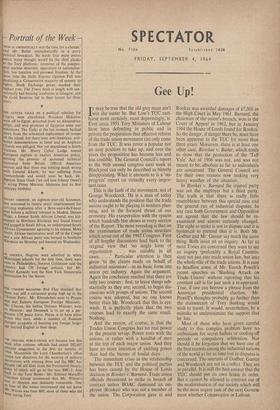Gee Up!
I T may be true that the old grey mare ain't wot she useter be. But Low's TUC cart- ' horse most certainly, most depressingly, is. Ever since 1951 Tory Ministers of Labour have been defending in public and in private the proposition that effective reform • of the trade union movement can only come from the TUC. It was never a popular nor art easy position to take up, and over the years the proposition has become less and less credible. The General Council's report to the 96th annual congress next week at Blackpool can only be described as bitterly disappointing. What it amounts to is a 'no- progress' report on virtually every impor- tant issue.
This is the fault of the movement, not of George Woodcock. He is a man of today who understands the position that the trade unions ought to be playing in modern plan- ning, and in the forward thrust of our economy. His exasperation with the system which handcuffs him shows in every section of the Report. The most revealing is that on the examination of trade union structure which arose out of the 1962 Congress. First of all lengthy discussions lead back to the original view that 'no single form of organisation . . . was suitable in all cases. . . .' Particular attention is then given 'to the claims made on behalf of industrial unionism'—in its basic form one union per industry. Again the argument. Again the conclusion reached that there are only two courses : first, to leave things sub- stantially as they are; second, to begin dis- cussions with groups of unions. The second course was adopted, but no one knows better than Mr. Woodcock that this is eye- wash. It is perfectly plain that the two courses lead to exactly the same result. Nothing.
And the reason, of course, is that the Trades Union Congress has no real power in the present set-up. Power rests with the unions, or rather with a handful of men at the top of each major union. And they have no more intention of yielding power than had the barons of feudal days.
The immediate crisis in the relationship between the TUC and the political parties has been caused by the House of Lords decision in Rookes v. Barnard. Trade union officials threatened to strike in breach of • contract unless BOAC dismissed an em- ployee (Rookes) who was not a member of the union. The Corporation gave in and Rookes was awarded damages of £7,500 in the High Court in May 1961. Barnard, the chairman of the union's branch, won in the Court of Appeal in 1962, but in January 1964 the House of Lords found for Rookes. So the danger, if danger there be, must have been apparent to the TUC for more than three years. Moreover, there is at least one other case, Riordan v. Butler, which tends to show that the protection of the 'Taff Vale' Act of 1906 was not, and was not meant to be, absolute as far as individuals are concerned. The General Council are for their own reasons now making very heavy weather of the situation.
In Rookes v. Barnard the injured party, was not the employer but a third party. The truth is that there is really, little resemblance between this special case and the general run of industrial disputes. In any case both Government and Opposition are agreed that the law should be re- examined and almost certainly changed. The right to strike is not in dispute and it is hysterical to pretend that it is. Both Mr. Godber and Mr. Gunter say much the same thing. Both insist on an inquiry. As far as most Tories are concerned they want to see an inquiry (preferably a Royal Commis- sion) not just into trade union law, but into the whole role of the trade unions. It is easy to headline some of Mr. Enoch Powell's recent speeches as 'Slashing Attack on Trade Unions' without reporting that his constant call is for just such a re-appraisal. True, if one can borrow a phrase from the American presidential election, Mr. Powell's thoughts probably go further than the mainstream of Tory thinking would wish to travel. It would, nevertheless, be a mistake to underestimate the support that he has.
Most of those who have given careful study to this complex problem have no enthusiasm for secret ballots or cooling-off periods or compulsory arbitration. Nor should it be forgotten that we have one of the best records among the industrial nations of the world as far as time lost in disputes is concerned. The interests of Godber, Gunter and Woodcock are not in conflict. They are in parallel. It is still the best answer that the TUC should put its own house in order. But it cannot be allowed to contract out of the modernisation of our society which will be the most urgent task of the next Govern- ment whether Conservative or Labour.






































 Previous page
Previous page